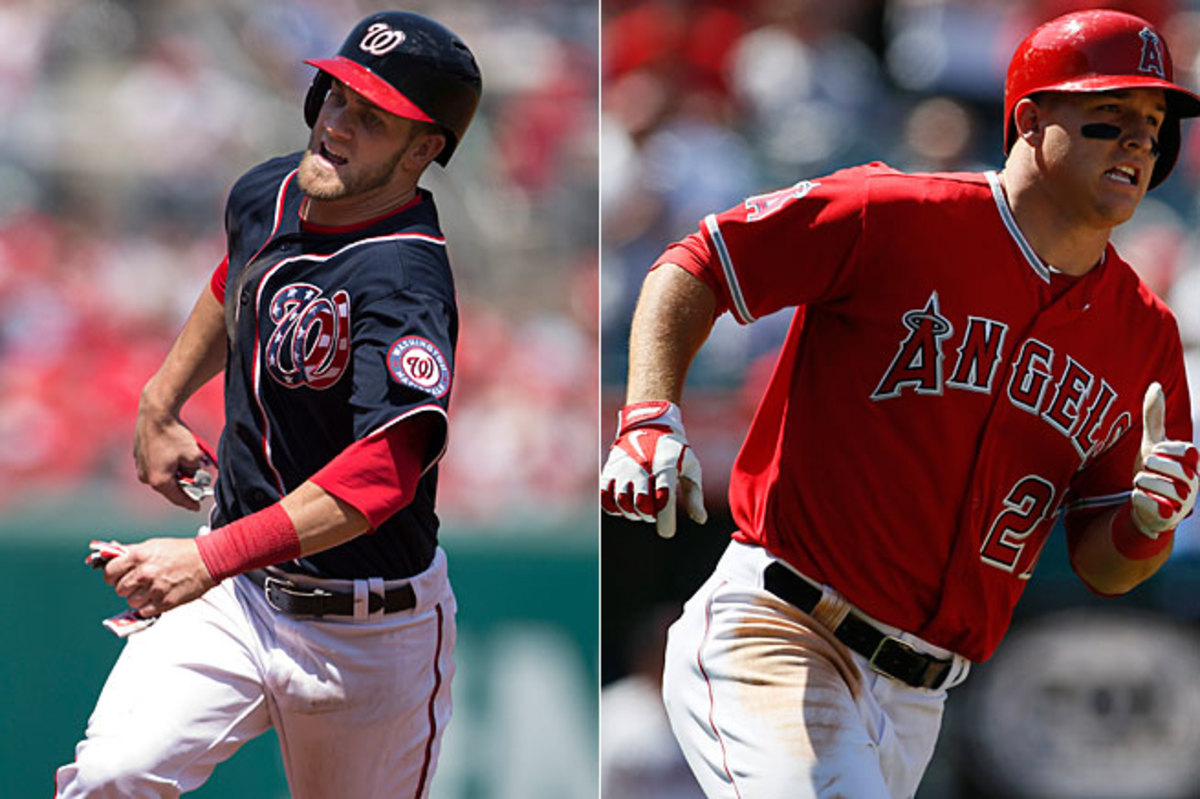One year in, Bryce Harper and Mike Trout are just getting started


It was one year ago today that the two most compelling careers in baseball began. A coincidence born, like so many baseball decisions, of necessity, of failure, of frustration, would kick off an argument that will rage for the next 20 seasons, and perhaps for the rest of the baseball century.
On April 28, 2012, Mike Trout joined the Angels at Progressive Field in Cleveland, playing leftfield and batting leadoff for an Angels team desperate to escape a 6-14 start. Hours later, at Dodger Stadium in Los Angeles, Bryce Harper trotted out to leftfield, perhaps with lighter expectations placed upon him -- he was batting seventh for a Nationals team that had won 70 percent of its games.
Not for long, of course. Harper tomahawked a fastball to deep center for a double in his third at-bat. By his fifth career game, after starting 5-for-13 with three doubles, Harper was jumped to third in the order. He would not start a game batting below the No. 5 spot thereafter, and he hasn't been listed on a lineup card below the No. 3 spot since the 19th game of his career -- last May 18. It wasn't because he always warranted high placement. A year ago yesterday, I wrote in my newsletter that Harper had yet to establish himself as a credible player above A ball, and that he wasn't ready for a major league job -- the promotion was as much about the Nationals having no one healthy who was better than him than Harper's talent.
One of those clauses is provably true; the other doesn't stand up so well. It's a reminder that measurable performance in the minor leagues is just part of the equation. Tools analysis and, heaven help me, intangibles do come into play. Teams will know better than outsiders, which isn't to say the teams always know, either.
After that sparkling start, Harper's performance would rise and fall as any player's would, leading to a .243/.292/.456 August and questions as to his role down the stretch for the Nationals. He put those to rest with a huge September and has further buried them by starting the 2013 season as the best player in the NL. After one year in the majors, Harper has a career line of .284/.356/.518, with 19 stolen bases in 27 tries and positive defensive value despite still being an inexperienced outfielder. He's a must-watch player, a mix of ungodly talent, hypercompetitiveness and inexperience, Nuke LaLoosh in Mickey Mantle's body with just enough Michael Jordan in him to be scary. Really scary. Harper doesn't have a Twitter feed devoted to telling me when he's up, and he doesn't need one -- I track his PAs like an addict, always aware, always anticipating his next one. Harper, one year in, has rewired my baseball brain.
The difference between Harper and Trout is in that sentence. You can drop in on Harper when he's in the batter's box and catch the show. The rest of the time, you mostly just hope he's not hurting anyone. With Trout, you have to see it all. The at-bats are just part of the show, the quick stroke generating more power than expected, the approach at the plate getting a little bit better by the day. Then he's on base, and you have to stay, because he might steal second, a slicker thief than a 12-term alderman. Inning over? Stick around to watch Trout chase down fly balls, even if it means climbing things, even if it means sticking his face in some lucky kid's popcorn, even if it means ruining your fantasy team's stats. Harper is Michael Jackson dancing. Trout is Prince playing every instrument on the album.
I was considerably more enthused about Trout's prospects a year ago, and at that, I never saw him coming. "Trout is a better player than [then-Angels outfielder Vernon] Wells," I wrote last year. "Trout is going to be a win or so better between defense and baserunning alone, and at worst Trout is a comparable hitter to Wells." High praise.
It's worth noting, for the historical record, that Trout didn't hit the ground running. He was hitting .182 after a week in the majors, on the heels of batting .220 as a teenager in 2011, and had even taken a seat on the bench one night. The next week he hit .450 with power, and by the end of the year the only thing he hadn't been able to do was make L.A.'s 6-14 start go away.
Trout's year featured a .318/.391/.546 line, 32 homers, 53 steals, many bases taken and many doubles taken away. He's outplayed Harper to date, outplayed everyone, in fact.
Trout has been the best player in baseball since his call-up, and he may carry that title for a while. When he loses it, he's probably going to lose it to Harper, and then maybe he'll take it back, and then lose it again, and then Harper and Trout will be old men of 25, 26, and who knows what they'll do.
I can't wait to find out.
